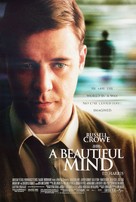Reviews provided by RottenTomatoes
Bruce Newman, San Jose Mercury News: You can practically feel director Ron Howard standing over your tear ducts, straining to extract every last salty drop. Read more
Terry Lawson, Detroit Free Press: Tells us little about paranoid schizophrenia, less about genius, and next to nothing about Nash. Read more
Richard Roeper, Ebert & Roeper: Screenwriter Akiva Goldsman has fashioned a powerful narrative that's brought to life by the outstanding cast and Howard's assured direction. Read more
Michael Wilmington, Chicago Tribune: Shows us the joys and terrors of seeing things that others can't. Read more
Kenneth Turan, Los Angeles Times: There is more to admire in A Beautiful Mind than you might suspect, but less than its creators believe. Read more
Jay Boyar, Orlando Sentinel: Howard gives Crowe the space he needs to build a memorable character. Read more
Steven Rea, Philadelphia Inquirer: Crowe and Connelly's work rises above the mush. Read more
Moira MacDonald, Seattle Times: Roger Deakins' handsome cinematography gives the film the look of a leather-bound classic. What keeps Mind from greatness, though, is some awkwardness in the screenplay, and the film's odd relationship with the true story of John Nash. Read more
Susan Stark, Detroit News: As bold and searingly imaginative as it is substantive. Read more
Philip Wuntch, Dallas Morning News: It too neatly pigeonholes the complexities of the dramatic situation, but the performances carry the show. Read more
Paul Clinton (CNN.com), CNN.com: Despite the 'Hollywoodization' of Nash's personal life, A Beautiful Mind is a thoughtful, provocative film about human frailties and human strength. Read more
A.O. Scott, New York Times: The movie can -- indeed, should -- be intellectually rejected, but you can't quite banish it from your mind. Read more
Jonathan Foreman, New York Post: Terrific, surprisingly gripping true-life tale of a math genius battling madness. Read more
Rex Reed, New York Observer: Nash's subterranean nightmare takes on the gripping elements of a psychological thriller. Read more
Lisa Alspector, Chicago Reader: Director Ron Howard's deftness in suggesting the subjective experience of Crowe's character, who's later diagnosed with schizophrenia, makes for inspirational narrative, but certain plot points are so reductive. Read more
Joe Morgenstern, Wall Street Journal: It isn't the device that's so crude, but the execution, which turns Nash's persecutory demons into nuisances that won't leave us alone. Read more
Eleanor Ringel Gillespie, Atlanta Journal-Constitution: A beautiful movie. Read more
Scott Tobias, AV Club: It's not a crime for the script to gloss over the thornier aspects of Nash's story, but the film seems totally unconvincing, squeezing a real life into a formula that's simultaneously more palatable and less interesting. Read more
Christy Lemire, Associated Press: A Beautiful Mind is Howard's best movie, and easily one of the best movies of the year. Read more
Eric Harrison, Houston Chronicle: Despite a shaky West Virginia accent, Crowe does exemplary work here, his best since The Insider. Read more
Steven Rosen, Denver Post: Like a good college education itself, A Beautiful Mind broadens your perspective on life. Read more
Lisa Schwarzbaum, Entertainment Weekly: Russell Crowe sometimes summons up one of the most powerful depictions of mental illness I have ever seen with barely an eyelid flicker separating manifestations of sickness from utterly sane displays of creative concentration. Read more
John Powers, L.A. Weekly: It's sad to see a beautiful mind whittled down by such a plain one. Read more
David Ansen, Newsweek: Screenwriter Akiva Goldsman's clever solution is to turn the story of a troubled academic into a Hollywood thriller. How? He makes things up. Read more
Anthony Lane, New Yorker: Crowe pulls out the stops, but he looks too bullish and controlled for such a pitiable victim. Read more
Peter Rainer, New York Magazine/Vulture: A light veneer of condescension hangs over A Beautiful Mind. Read more
Jami Bernard, New York Daily News: The result is one of the most successful attempts to make math look sexy, even if the movie strays - gallops, really - from the details of the actual life of Nobel Prize-winner John Forbes Nash Jr. Read more
James Berardinelli, ReelViews: A beautifully written, effectively acted, and meticulously crafted effort. Read more
Roger Ebert, Chicago Sun-Times: The movie fascinated me about the life of this man. Read more
Peter Travers, Rolling Stone: Sadly, Howard blands out in the final third, using old-age makeup and tear-jerking to turn a tough true story into something easily digestible. Until then, you'll be riveted. Read more
Edward Guthmann, San Francisco Chronicle: Nicely filmed by Roger Deakins and magnificently performed by Crowe, who never fails to surprise. Read more
Colin Covert, Minneapolis Star Tribune: Crowe's interpretation of this tortured genius is textured and complex. Read more
Rick Groen, Globe and Mail: In the hands of a better director than Ron Howard, such a protean mix of reason and madness could have made for a tale of Shakespearean complexity. Instead, all we get is a feel-good flick. Read more
Geoff Pevere, Toronto Star: Since love conquers all, you know everything will turn out okay. It's practically a mathematical formula. Read more
Richard Schickel, TIME Magazine: The result is mainstream moviemaking at its highest, most satisfying level. Read more
Tom Charity, Time Out: At its most effective when it seems to lose the plot in a scrambled second act that posits the Cold War as a collective paranoid delusion, the film reverts to type (and to fact) for a sentimental anti-climax. Read more
Mike Clark, USA Today: Among the most affecting ever made about co-existing with mental demons. Read more
Todd McCarthy, Variety: Consistently engrossing as an unusual character study and as a trip to the mysterious border-crossing between rarified brilliance and madness. Read more
Dennis Lim, Village Voice: The movie illustrates with poignant (if reductive) clarity the awful no-exit paradox of a paranoid delusion -- that its most incapacitating aspect is its terrifying realness. Read more
Desson Thomson, Washington Post: One of those formulaically rendered Important Subject movies. Read more

